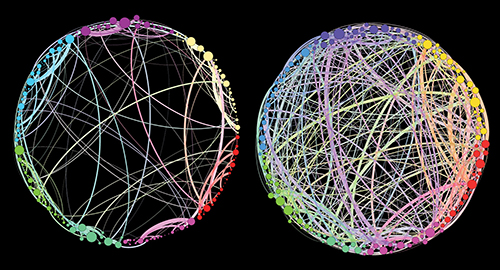The findings, published today in the Lancet Psychiatry Journal revealed that 67% of patients were depression free 1 week after treatment, and 42% still in remission 3 months later. These patients had suffered an average of over 18 years of depression and had found no respite in any other treatment.
Previous results
Previous studies on psilocybin, the active ingredient in magic mushrooms, have shown a vast increase in brain activity and connections across the whole brain with non-communicative areas ‘talking’ to each other (see image below comparing normal brain activity, on the left, with that taken of patients given psilocybin, on the right.)

A previous study on psilocybin mushrooms investigated personality and behavioural changes in volunteers who had been given psilocybin after one year. It found that ‘openness remained significantly higher than baseline more than one year after the session’.6 Another small study has reported that LSD permanently reduces anxiety in a number of patients.7 Another, a randomized controlled study, has reported that MDMA is effective for treating post-traumatic stress disorder.8
We have much to learn and much research is underway and being planned at more than a dozen major universities such as Johns Hopkins University Medical School in Baltimore, Maryland, and London’s Imperial College and University College London. The radical psychiatrist Stanislav Grof, who has used psychedelic drugs for psychotherapeutic benefit in thousands of patients says, ‘Psychedelics, used responsibly and with proper caution, could be for psychiatry what the microscope is for biology and medicine, or the telescope is for astronomy.’
Cautions
I hope that in the not too distant future there will be a reclassification of these psychedelic substances for psychotherapeutic use. Many are relatively non-toxic and only capable of inducing adverse effects if used excessively or in the wrong context, without support. Used intelligently, for purposes of insight rather than purely for recreation, they have real therapeutic potential. However, they are not for everyone – and that is why they are best taken with a reliable guide or experienced psychotherapist.
Side effects
While not toxic in the sense of leading to physical overdose, some users have had breakdowns or done things that have led to their injury or death while under the influence of these drugs. The most widely reported effect is the dehydration of people on drugs sold as Ecstasy (which is often not pure MDMA) dancing all night at raves and, in some tragic cases, over hydration. Also, ‘street’ drugs are often not pure and, in many cases, it is the impurities that cause adverse effects. Frequent use of MDMA also depletes serotoninSerotonin is a hormone found naturally in the brain and digestive tract. It is often referred to as the ‘happy hormone’ as it influences mood…. and could, therefore, exacerbate depression in the long term. It is thus perhaps more therapeutically useful for resolving trauma-related anxiety and depression.
A more enlightened form of psychiatry
I hope we will see an emergence of a more enlightened form of psychiatry along the lines of Stanislav Grof’s vision, which is that the psychiatrist’s job is to enable a person to enter a non-ordinary state of consciousness in a safe, supportive environment and help them integrate the healing and learning that take place.
I believe that mental illness can be the result of biochemical imbalances as well as present-day stresses and the pressure of unexpressed past traumas. Most mental breakdowns are a ‘perfect storm’ of these three contributors. So much can be achieved with nutritional medicine and really good psychotherapy, including recognition of the transpersonal or spiritual domain.
The trouble is that none of these natural plant medicines or nutrients or psychotherapeutic techniques can be patented – they already exist in nature – so there’s no money to be made. The money is in man-made, patentable drugs.
Hopefully, with the ‘war on drugs’ strategy having proven a dismal failure everywhere, a more intelligent approach to drugs, including entheogens, will emerge in our culture. If there is a need for a ‘war on drugs’ it should be on psychiatric drugs. Yet, despite this, the new Psychoactive Drugs Bill came into effect in the UK in April, which makes illegal anything that is in any way mind-altering. As George Bernard Shaw said “Those who cannot change their minds cannot change anything.”
To find out more about food and the brain, read Optimum Nutrition for The Mind.

Comments
Join the Conversation on our Facebook Page